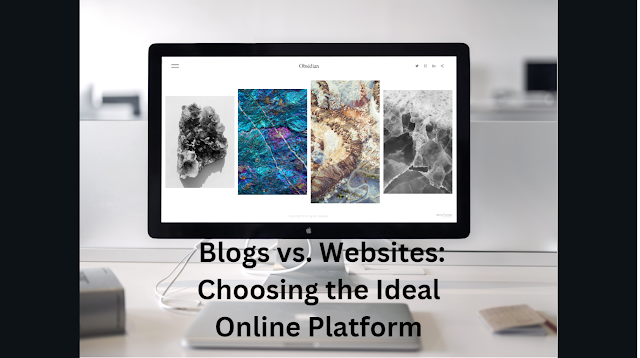Blogs vs. Websites: Choosing the Ideal Online Platform
Blogs vs. Websites: Choosing the Ideal Online Platform
In the digital realm, the terms "blog" and "website" are often used interchangeably, leading to confusion about their actual distinctions. While both serve as online platforms for sharing information, they have unique characteristics and purposes. In this article, we'll delve into the key differences between blogs and websites to help you understand which is right for your online venture.
Understanding Blogs
Blogs are dynamic online journals or informational platforms where content is organized in reverse chronological order. They primarily consist of posts that often express personal thoughts, experiences, or provide valuable insights on specific topics. Blogs encourage interaction through comments and discussions.
Characteristics of Blogs:
- Frequent Updates: Blogs are regularly updated with new content, keeping readers engaged and informed.
- Chronological Order: The latest posts appear at the top, creating a timeline of entries.
- Personal Tone: Blogs often have a more personal and informal writing style, connecting with readers on a relatable level.
- Comments and Interaction: Readers can leave comments, fostering discussions and engagement.
- Niche-Focused: Many blogs center around specific niches, catering to a targeted audience.
- Storytelling: Blogs often incorporate storytelling elements to engage and captivate readers.
Understanding Websites
Websites are broader online platforms that encompass various types of content, including static pages, multimedia, e-commerce, portfolios, and more. They serve as comprehensive destinations for businesses, organizations, artists, and individuals to establish their online presence.
Characteristics of Websites:
- Diverse Content: Websites can contain a wide range of content, from articles and images to videos and interactive elements.
- Structured Pages: Websites feature static pages that provide comprehensive information about products, services, or topics.
- Navigation: Websites have clear navigation menus to help users explore different sections and pages.
- Professional Tone: Websites often adopt a formal and professional tone, suited for presenting information.
- Functionality: Websites can include e-commerce features, contact forms, membership areas, and other interactive elements.
- Branding: Websites serve as a branding tool, representing an entity's identity and values.
Choosing the Right Platform
The decision between a blog and a website depends on your goals and the nature of your content. If you aim to regularly share personal insights, commentary, or industry news, a blog might be suitable. On the other hand, if you're establishing a business presence, showcasing your portfolio, or providing extensive information about your services, a website is more appropriate.
Final Thoughts
In the dynamic world of online content, understanding the difference between blogs and websites is essential for making informed decisions about your online presence. Whether you're a passionate blogger or an entrepreneur seeking to establish an online storefront, recognizing the unique attributes of each platform will help you create a digital space that aligns with your goals and resonates with your target audience.
Blogging:
 Reviewed by SSC NOTES
on
November 27, 2023
Rating:
Reviewed by SSC NOTES
on
November 27, 2023
Rating:
